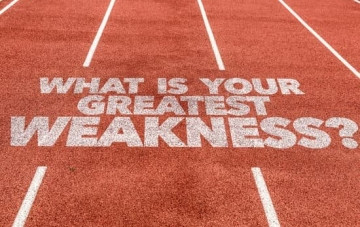How to answer "what is your greatest weakness?" in an interview
- June 30, 2020

How to answer “what is your greatest weakness?” in an interview.
“What is your greatest weakness?” is the question that no one ever knows how to answer. It has the power to determine whether you are a potential asset or liability to a prospective employer. Surveys suggest that this is the second most asked question after “What are your strengths?”, so it’s important to find the right answer. That’s why we want to help you prepare in advance so you’re ready for this dreaded question…
Why do they ask it?
Today, many HR professionals and candidates consider this question old-fashioned and pointless. After all, who would openly confess to their biggest weakness in the middle of a job interview? But unfortunately, it still gets asked, over and over again. Interviewers who do ask this question often want to assess your self-awareness, your willingness to develop and your honesty. It shows that you can recognise things that you need to work on and that you are not too proud to admit it. It is therefore important to be honest but also to make sure you come across positively. They may also see it as a test of how much you have prepared for the interview. So, being ready for this question is the best strategy.
Honesty is the best policy!
Tell the truth (to a certain extent). It is much better to choose a weakness that you are actively working to overcome, than to pretend you’re perfect (nobody is)! Everyone has flaws and by saying that you don’t shows a lack of self-awareness, an incredible ego, or dishonesty. You may have only one weakness (if you are very lucky). But, if you’re like most of us, you have several weaknesses and at least one of them will be interview-friendly.
Choosing your weakness.
Pick a weakness that is acceptable for the job at hand. It is critical you avoid mentioning weaknesses that will prevent you from performing well in the role. Also, don’t cite a weakness that is one of the required skills or attributes in the job specification. For example, if you're applying for a data analyst role, you don't want to say, "I struggle working with numbers". Alternatively, if you’re applying for a Sales role, don’t confess that you “lack confidence and determination”. You do, however, want to choose a weakness that shows you are:
- Aware that you are not perfect.
- Able to recognise when you lack a skill.
- Interested in continued learning and self-improvement.
Select a weakness that is relatively minor and “fixable”, so something you can improve through hard work and motivation. For example, not having substantial experience on Excel, particularly using pivot tables. (You can get better at this through practice and online classes or training).
Give it a positive spin!
In the second part of your answer, you need to describe how you have already taken steps to improve your weakness and how you’ll go on to master it. For example, “I have already started taking Excel classes in my own time, as well as booking in time with the IT superuser at work”. This helps to cancel out any negativity your answer has created and shows that you are self-aware, striving to improve and determined to be successful in your career. Use your answer to demonstrate your motivation to be the best at what you do. This is how to truly emphasize the positive when talking about your weakness!


You can also use your social account to sign in. First you need to:
Accept Terms & Conditions And Privacy Policy